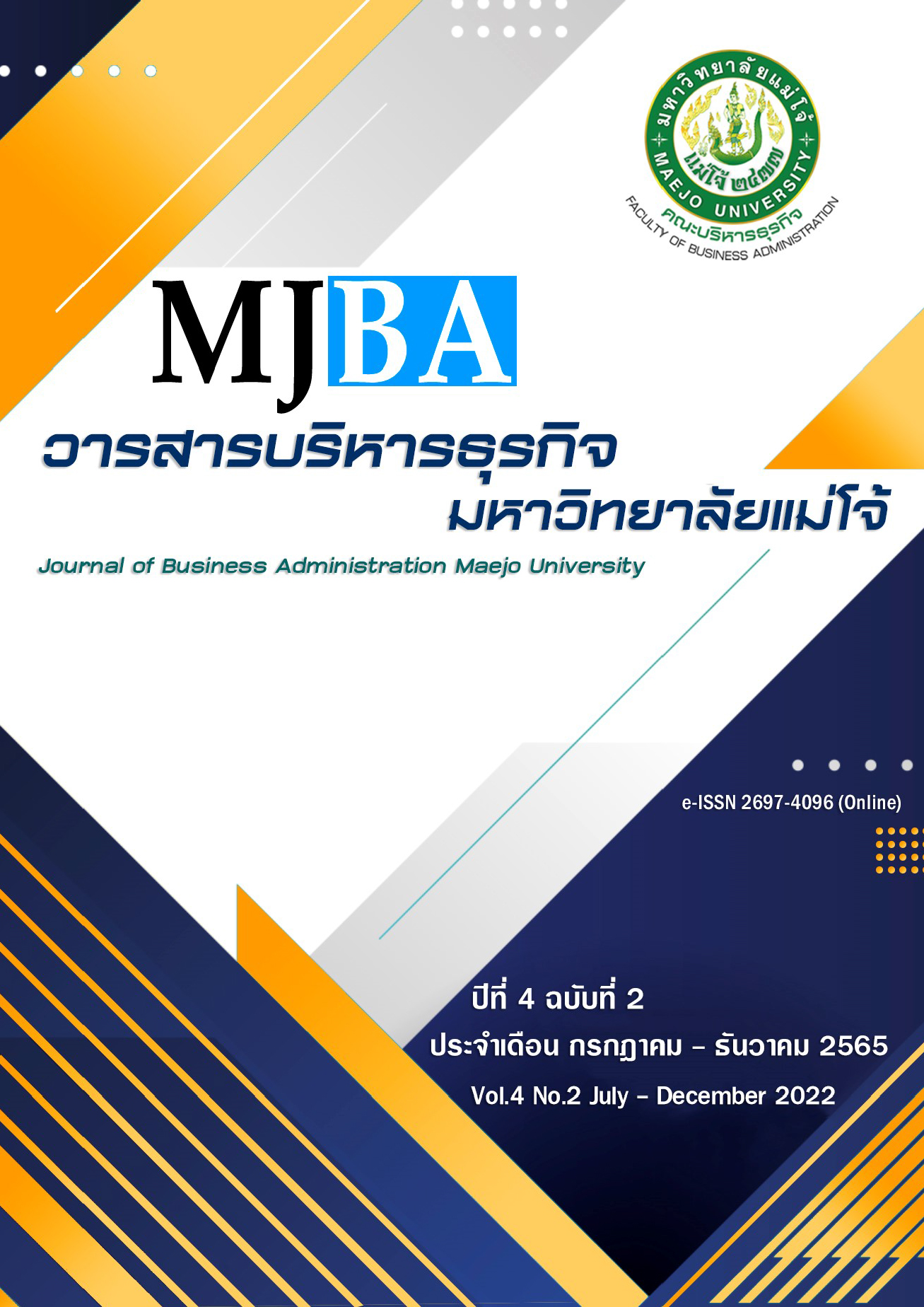การตรวจสอบเชิงประจักษ์เกี่ยวกับปัจจัยที่มีอิทธิพลต่อความตั้งใจซื้อของผู้บริโภคที่มีต่อโซเชียลคอมเมิร์ซ: วิธีการสร้างแบบจำลองสมการเชิงโครงสร้าง
DOI:
https://doi.org/10.14456/mjba.2022.8คำสำคัญ:
การตั้งใจซื้อ, การยอมรับเทคโนโลยี, การรับรู้ความเสี่ยง, ความวางใจ, โซเชียลคอมเมิร์ซ, บรรทัดฐานทางสังคมบทคัดย่อ
การวิจัยครั้งนี้มีวัตถุประสงค์เพื่อตรวจสอบปัจจัยที่มีอิทธิพลต่อการตั้งใจซื้อสินค้าทางโซเชียลคอมเมิร์ซ โดยใช้ทฤษฎีการยอมรับเทคโนโลยีประกอบด้วยปัจจัย การรับรู้ประโยชน์ในการใช้งาน การรับรู้ความง่าย และทัศนคติจะใช้งาน โดยมีปัจจัยเชิงสาเหตุ ได้แก่ การรับรู้ความเสี่ยง ความวางใจ และบรรทัดฐานทางสังคม ประชากรคือนิสิตคณะการบัญชีและการจัดการจำนวน 8,000 คน กลุ่มตัวอย่างคือนิสิตที่ใช้สื่อสังคมออนไลน์ จำนวน 431 คน เครื่องมือในการรวบรวมข้อมูลคือแบบสอบถามและเก็บข้อมูลด้วยวิธีการสุ่มตัวอย่างแบบสะดวก วิเคราะห์ข้อมูลด้วยสถิติเชิงพรรณนา และวิเคราะห์โมเดลสมการเชิงโครงสร้างด้วยวิธีถดถอยกำลังสองน้อยที่สุดบางส่วน (Partial Least Square: PLS-SEM) ด้วยโปรแกรม Smart PLS 3.0 ผลการวิจัยพบว่า 1) การรับรู้ความง่ายมีอิทธิพลและส่งผลเชิงบวกต่อการรับรู้ประโยชน์ในการใช้งานและทัศนคติจะใช้งาน 2) การรับรู้ประโยชน์ในการใช้งานมีอิทธิพลและส่งผลเชิงบวกต่อทัศนคติจะใช้งาน 3) ทัศนคติจะใช้งานมีอิทธิพลและส่งผลเชิงบวกการตั้งใจซื้อสินค้า 4) การรับรู้ประโยชน์ในการใช้งานไม่มีอิทธิพลและส่งผลเชิงบวกต่อการตั้งใจซื้อ และ 5) ปัจจัยเชิงสาเหตุมีเพียงบรรทัดฐานทางสังคมที่มีอิทธิพลและส่งผลต่อการรับรู้ประโยชน์ในการใช้งาน ผลการวิจัยในครั้งนี้จะเป็นประโยชน์ต่อผู้ประกอบการโซเชียลคอมเมิร์ชเพื่อใช้เป็นแนวทางในวางแผนพัฒนาธุรกิจให้เติบโตต่อไป
เอกสารอ้างอิง
กองแผนงาน สำนักงานอธิการบดี มหาวิทยาลัยมหาสารคาม. (2563). ข้อมูลพื้นฐานปี 2563. http://www.plan.msu.ac.th/thai2018/wp-content/uploads/2021/02/r-2563.pdf
เกรียงศักดิ์ จันทีนอก และพลาญ จันทรจตุรภัทร. (2562). ผลกระทบของชนชั้นทางสังคมกับแรงจูงใจทางสังคมที่มีต่อความตั้งใจซื้อสินค้าออนไลน์: หลักฐานเชิงประจักษ์จากมุมมองผู้บริโภคในประเทศไทย. วารสารจุฬาลงกรณ์ธุรกิจปริทัศน์, 41(160), 57-83.
ธาดาธิเบศร์ ภูทอง. (2563). ปัจจัยเชิงสาเหตุของความตั้งใจซื้อออนไลน์ของผู้บริโภคในอุตสาหกรรมการบริการ: การวิเคราะห์ด้วย PLS-SEM. วารสารมหาวิทยาลัยศิลปากร, 40(5), 89-103.
ปราโมทย์ ลือนาม (2554). แนวความคิด และวิวัฒนาการของแบบจำลองการยอมรับการใช้เทคโนโลยี. วารสารการจัดการสมัยใหม่, 9(1), 9–17.
ภัทราวดี วงศ์สุเมธ. (2556). ปัจจัยที่มีอิทธิพลต่อการยอมรับและการใช้งานระบบการเรียนผ่านเว็บ. วารสารนักบริหาร, 33(3), 1-10.
มนตรี พิริยะกุล. (2562). ตัวแบบสมการโครงสร้างและการใช้โปรแกรม PLS. สำนักงานคณะกรรมการวิจัยแห่งชาติ (วช.).
วิภาวี จันทร์แก้ว และบุหงา ชัยสุวรรณ. (2561). ปัจจัยพยากรณ์การใช้งานการพาณิชย์ผ่านเครือข่ายสังคมออนไลน์. วารสารการสื่อสารมวลชน, 6(1), 206-236.
ศรัณยพงศ์ เที่ยงธรรม. (2565). ความตระหนักเรื่องสุขภาพและทัศนคติที่ส่งผลต่อความตั้งใจซื้อประกันสุขภาพของผู้บริโภคในกรุงเทพมหานคร. วารสารบริหารธุรกิจ มหาวิทยาลัยแม่โจ้, 4(1),23-40.
ศรัณย์พร ศศิธนากรแก้ว. (2558). การยอมรับเครือข่ายสังคมออนไลน์ (SNS) ของกลุ่มเจเนอเรชั่นวาย (Gen Y). สุทธิปริทัศน์, 29(92), 65-79.
ศิริลักษณ์ โรจนอำนวย. (2561). การรับรู้ความเสี่ยงและความไว้วางใจที่ส่งผลต่อการซื้อ ผ่านพาณิชย์อิเล็กทรอนิกส์ข้ามพรมแดน. จุฬาลงกรณ์ธุรกิจปริทัศน์, 40(157), 79-99.
สมเกียรติ ภู่พัฒน์วิบูลย์. (2564). ปัจจัยส่วนประสมทางการตลาดออนไลน์และความภักดีของลูกค้า:ข้อมูลป้อนกลับจากบทรีวิวโดยลูกค้าลาซาด้า. วารสารวิจัยวิทยาการจัดการ มหาวิทยาลัยราชภัฏสุรินทร์, 5(2), 88-102.
สำนักงานพัฒนาธุรกรรมทางอิเล็กทรอนิกส์. (2563). รายงานพฤติกรรมผู้ใช้งานอินเทอร์เน็ตของประเทศไทย. https://www.etda.or.th/th/useful-resource/publications/thailand-internet-user-behavior-2020_slides.aspx
สุธีรา เดชนครินทร์ ธนัญญา ยินเจริญ และอัคญาณ อารยะญาณ. (2561). ความสัมพันธ์ระหว่างแรงสนับสนุนทางสังคม ความไว้วางใจ และความตั้งใจซื้อ ทางโซเชียลคอมเมิร์ซ. วารสารการจัดการสมัยใหม่, 16(2), 71-82.
สุรสิทธิ์ อุดมธนวงศ์. (2562). ภาพลักษณ์ตราสินค้าและการยอมรับเทคโนโลยีที่มีอิทธิพลต่อความตั้งใจใช้บริการจองโรงแรมผ่านแอปพลิเคชัน. วารสารเกษมบัณฑิต, 20(2), 56-67.
Ajzen, I. & Fishbein, M. (1975). Belief, attitude, intention, and behavior: An introduction to theory and research. Reading, Mass: Addison-Wesley Pub. Co.
Biucky, S. T., Abdolvand, N., & Rajaee Harandi, S. (2017). The effects of perceived risk on social commerce adoption based on the tam model. International Journal of Electronic Commerce Studies, 8(2), 173-196.
Davis, F., Bagozzi, R., & Warshaw, P. (1989). User acceptance of computer technology: a comparison of two theoretical models. Management Science, 35(8), 982-1003.
Hair, J., Black, W., Babin, B., & Anderson, R. (2010). Multivariate data analysis: A Global Perspective. Pearson.
Hair, J. F., Hult, T. M., Ringle, C. M., & Sarstedt, M. (Eds.). (2014). A primer on partial least squares structural equation modeling (PLS-SEM). SAGE.
Meyliana, Fernando, Erick & Surjandy. (2019). The influence of perceived risk and trust in adoption of fintech services in Indonesia. CommIT (Communication and Information Technology) Journal, 13(1), 31-37.
Olanrewaju, A.-S., Alamgir Hossain, M., Whiteside, N., & Mercieca, P. (2020). Social media and entrepreneurship research: a literature review. International Journal of Information Management, 50, 90-110.
Rehman, S. U., Bhatti, A., Mohamed, R., & Ayoup, H. (2019). The moderating role of trust and commitment between consumer purchase intention and online shopping behavior in the context of Pakistan. Journal of Global Entrepreneurship Research, 9(43), 1–25.
Sohn, Jeong Woong & Kim, Jin Ki, (2020). Factors that influence purchase intentions in social commerce. Technology in Society, 63(C) 101365.
Suleman, D., Ida, Zuniarti, Sabil, Setyaningsih, Eka. D., Yanti, Vera A., Susilowati, Isnurrini. H., Sari, Imelda., Marwansyah Sofyan. Hadi Seno. Sudarmono., Lestiningsih, Amin Setio. (2019). Decision model based on technology acceptance model (TAM) for online shop consumers in indonesia. Academy of Marketing Studies Journal, 23 (4), 1-14.
Venkatesh, V., & Davis, F. D. (2000). A theoretical extension of the technology acceptance model: four longitudinal field studies. Management Science, 46(2), 186–204.
Yin, X., Wang, H., Xia, Q., & Gu, Q. (2019). How social interaction affects purchase intention in social commerce: a cultural perspective. Sustainability, 11, 2423-2441.

ดาวน์โหลด
เผยแพร่แล้ว
รูปแบบการอ้างอิง
ฉบับ
ประเภทบทความ
สัญญาอนุญาต
ลิขสิทธิ์ (c) 2022 วารสารบริหารธุรกิจ มหาวิทยาลัยแม่โจ้

อนุญาตภายใต้เงื่อนไข Creative Commons Attribution-NonCommercial-NoDerivatives 4.0 International License.









